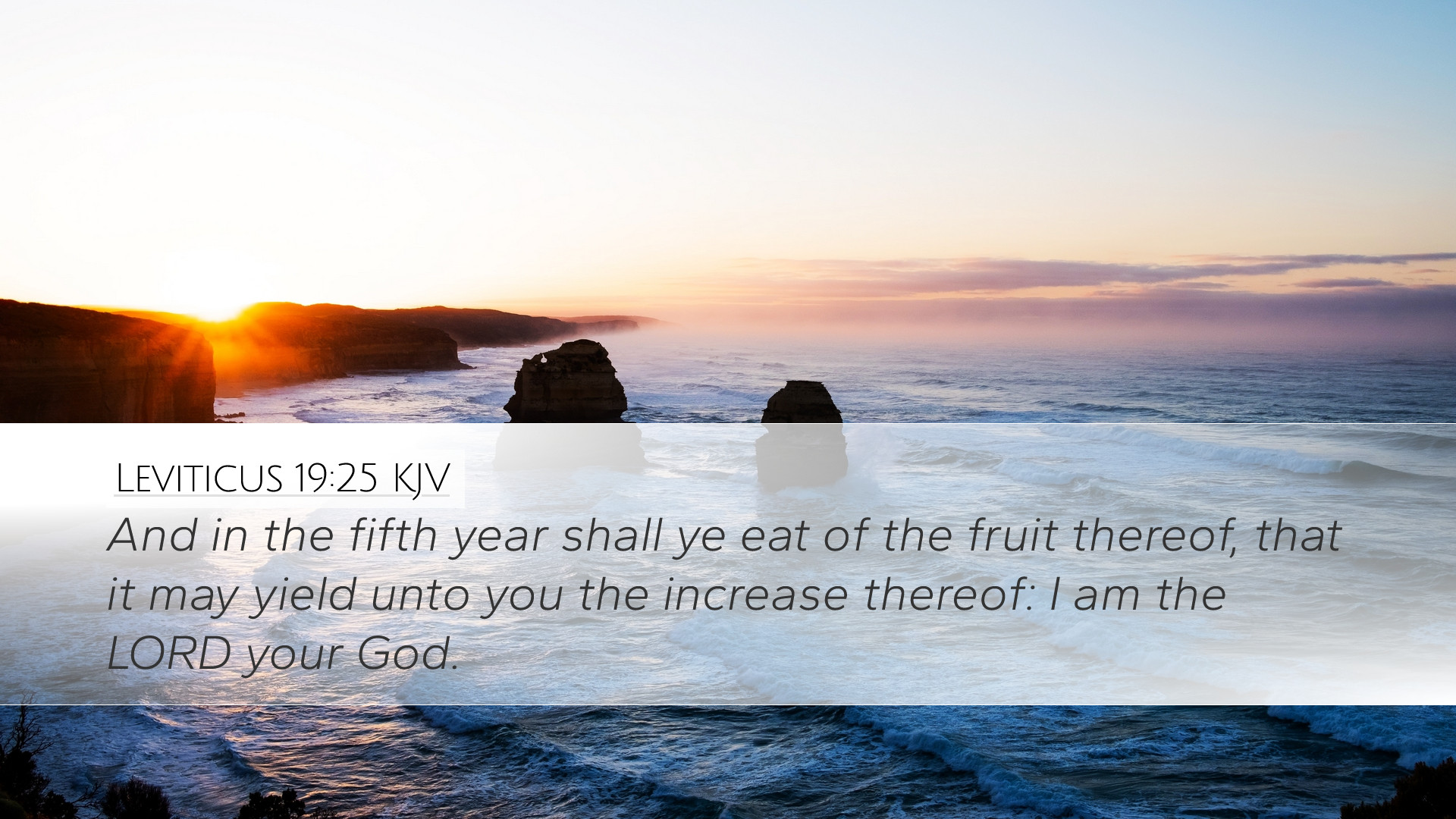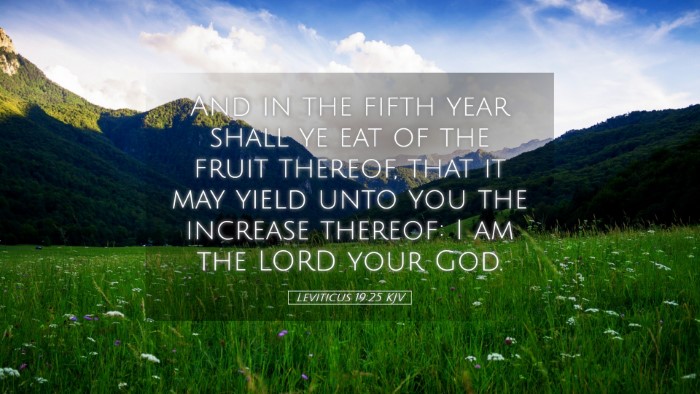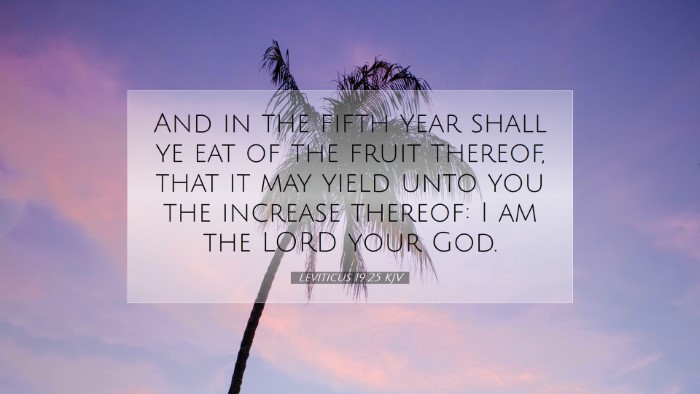Commentary on Leviticus 19:25
Verse Reference: Leviticus 19:25 - "And when ye shall come into the land, and shall have planted all manner of trees for food, then ye shall count the fruit thereof as uncircumcised three years shall it be uncircumcised unto you: it shall not be eaten of."
Introduction
Leviticus 19:25 is situated within the Holiness Code, a section of the book that emphasizes God's call for His people to be distinct and holy. This verse speaks directly to the cultivation of fruit trees and the guidelines surrounding their consumption. It provides not only agricultural regulations but also deeper theological implications regarding holiness, patience, and the sacredness of God’s gifts.
Historical Context
The laws provided in Leviticus were given to the Israelites as they prepared to enter the Promised Land. These directives were crucial in shaping their identity as God’s chosen people. The Israelites were familiar with agricultural practices, and these regulations served to instill a sense of discipline and reverence for God's creation.
Exegesis of the Verse
“When ye shall come into the land...” - The opening phrase points to a future event, indicating anticipation and action. This was not merely an immediate instruction but a God-given promise concerning the Israelite's future settlement and prosperity in Canaan.
“...and shall have planted all manner of trees for food...” - This illustrates the agricultural foundation of Israelite sustenance. The act of planting signifies an investment in the land and a responsibility to the environment.
“...then ye shall count the fruit thereof as uncircumcised...” - The term "uncircumcised" is metaphorical and symbolizes a state of being not yet consecrated or set apart for God's purposes. The fruit, much like the humans who are to be circumcised, must undergo a process of becoming holy and legitimate for consumption.
“...three years...” - This requirement of waiting three years reflects the necessary patience and reverence believers must show towards God’s creation. It serves to teach the Israelites about the sanctity and value of God’s timing, emphasizing that some blessings require maturity and may not always be immediate.
“it shall not be eaten of.” - This prohibition stresses the importance of waiting for something to be deemed ready and acceptable. Consumption before the designated time could symbolize a lack of respect for God's order and ongoing relationship with creation.
Theological Insights
The concepts communicated in Leviticus 19:25 extend beyond agricultural laws; they invite deeper spiritual reflections on holiness and God's providence.
- Holiness: The emphasis on the fruit being uncircumcised for three years connects to the broader theme of holiness within the community of Israel. Just as the fruit had to be set apart and matured, so too are the Israelites called to be distinguished from other nations.
- Patience and Maturity: This regulation underscores the value of patience. Spiritual growth and maturity often require time, and individuals are called to wait upon the Lord and not rush into enjoying the fruits of their labor without first considering divine timing.
- Understanding God’s Gifts: The fruit of the trees is a symbolic representation of God’s blessings. Recognizing that these blessings must be enjoyed at the right time fosters a sense of gratitude and intentionality in their stewardship.
Commentaries from Respected Scholars
Matthew Henry
Matthew Henry emphasizes the significance of waiting before partaking of the bounty God provides. He elaborates that this waiting period serves as a reminder of God's sovereignty over creation and His directive that humans should act with care and reverence towards what He has made.
Albert Barnes
Albert Barnes notes the symbolic meaning behind the three-year waiting period. He interprets this as indicative of a broader spiritual principle—namely, that believers should not approach the gifts of God without proper consecration and readiness. He highlights that God's laws are meant to nurture a relationship based on respect and reverence.
Adam Clarke
Adam Clarke provides a linguistic analysis of the term "uncircumcised," explaining its connotations in the Hebrew culture. He points out that the divine law teaches the Israelites that not everything produced by their hands is immediately acceptable and that recognition of God’s roles in blessing and timing is critical to their communal and personal spirituality.
Practical Applications
For pastors, students, and theologians, Leviticus 19:25 offers profound implications for contemporary faith practice:
- Consider the practice of patience in the pursuit of goals and in ministry contexts, reflecting on how decisions affect the spiritual maturity of individuals and congregations.
- Encourage a deeper appreciation for God's timing in their lives, cultivating an understanding that blessings may need time to mature before being fully realized.
- In discussions regarding stewardship, utilize this verse to promote responsible engagement with God’s created order, reminding congregants of their duty to respect and nurture all aspects of the environment.
Conclusion
Leviticus 19:25, while seemingly a simple agricultural regulation, encapsulates profound principles of holiness, patience, and recognition of divine providence. By intertwining personal spiritual development with communal responsibility, this verse challenges believers to cultivate their lives, ensuring that they are ripe and ready for God's purposes.


